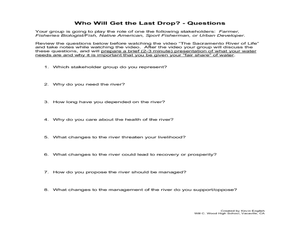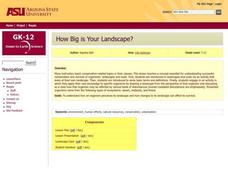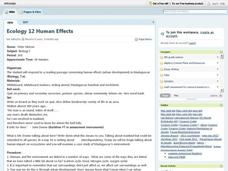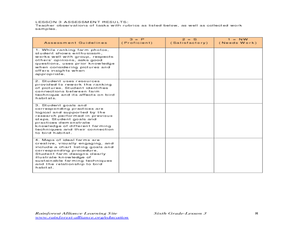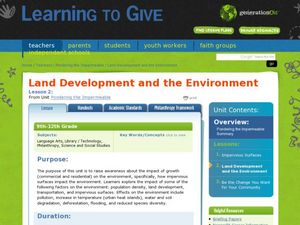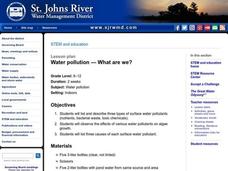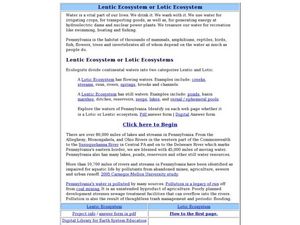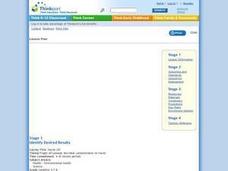Curated OER
Measurement of Biotic and Abiotic Objects
Students identify biotic and abiotic factors. In this environmental study lesson plan, students conduct a series of experiments to collect and record data and draw conclusions based on the results.
Curated OER
Plant Diversity and Distribution
Students construct a defined plot on school grounds and observed patterns in plant life. They count trees, shrubs, cacti and record on a data sheet. They compare data and generate a plant diversity overlook for their school.
Curated OER
Zebra Mussel Population Simulation
Students are taught how to format and enter data into an Excel spreadsheet. They make a graph, and interpret graphed data. Students discuss the possible impacts of zebra mussels on the Hudson river. They graph zebra mussel data.
Curated OER
Whose Bud Are You?
Students visit an orchard and examine tree branches. They discover the buds on the branches looking for signs of life. They share their observations in their journals and with their classmates.
Curated OER
Green Space in the City
Students identify the different kinds and uses of green space that exist in an urban area. They create maps of local parks and research the history of each park. They conduct a survey of residents near the park and interview a park...
Curated OER
Who Will Get the Last Drop?
Students discuss the importance of California's water system. In this earth science lesson plan, student play the role of different stakeholders. They present a 2-3 minute argument on their group's perspective about their need for water.
Curated OER
How Big Is Your Landscape?
Students explore how an organism perceives its landscape and how changes to its landscape can effect its survival. Of particular focus is the effect of urbanization and the organisms survival in the cities.
Curated OER
The Immigrant Experience In America
Students study immigration, Ellis Island, and tenement life from 1890 to 1924. Each student create an identity of an immigrant and write an essay in the first person. Essays describe what they found when they arrived in New York City.
Curated OER
Tobacco Smoking and Lung Cancer
Young scholars explore tobacco smoking and the impact it has on society. In this health lesson students complete several experiments on smoking and lung cancer.
Curated OER
Water and Ice
Students observe what happens to water as it goes from a solid to a liquid. In this exploratory lesson plan students gain an understanding for the water cycle while working in groups observing what happens to water as it changes...
Curated OER
Ecology 12 Human Effects
Young scholars are able to respond to a reading passage concerning human effects (under development) in Madagascar. They have a quiz on primary and secondary succesion as their bell ringer. Students write an essay on the topic "No man...
Curated OER
The Breathtaking Nature of the Urban Explosion, Part 4
High schoolers explore the respiratory system. They use a computer to monitor the respiratory rate of an individual. They determine residual oxygen levels in exhaled air. Students evaluate how internal 02 and C02 concentrations...
Curated OER
Elasticity and Collapse
Students discuss the oil crisis and a future world without oil. In this oil lesson, students watch videos online based on the reduced oil supply. They discuss how their regional community depends on oil and what would happen if the oil...
Curated OER
Stream Table
Students explore channelization, riparian habitats and soil erosion to find out about the aquatic habitats in Iowa. In this aquatic habitats lesson, students define important terms and read an article about pollution. ...
Curated OER
Shoot for the Moon
Second graders distinguish the different phases of the moon. In this astronomy lesson, 2nd graders study the history of its discovery and myths about its origin. They simulate how the moon's surface is illuminated by the sun.
Curated OER
What is a National Forest
Students select and research a National Forest near their local community. They read and discuss the pamphlet "A Guide To Your National Forests," view photos of national forests, conduct Internet research, and complete the student...
Curated OER
How can my breakfast help the birds?
Sixth graders design farms with a bird's habitat in mind. In this farm lesson plan, 6th graders research how sun grown coffee destroys a bird habitat, and then they make their own farm with a bird's habitat being preserved. They then...
Curated OER
Land Development and the Environment
Students examine the relationship between land development and the environment. In this environmental stewardship lesson, students explore how population density, land development, transportation, and impervious surfaces take their toll...
Curated OER
What Are We?
Students list and describe three types of surface water pollutants. They observe the effects of various water pollutants on algae growth. Three causes of each surface water pollutant is listed.
Curated OER
Get to Know- Insects, Spiders and Others
Students investigate live insects. In this insects and spiders lesson, students work in groups to explore the outdoors and capture insects. Students observe, discuss and record information about the insects they discover. Students...
Curated OER
Planting Pumpkins
Young scholars plant pumpkins. In this agriculture lesson, students use pumpkin seeds, mulch, and shovels to plant seeds from a pumpkin. Young scholars observe the changes during each season.
Curated OER
Lentic Ecosystem or Lotic Ecosystem
Students explore the differences between lentic and lotic ecosystems. In this ecology lesson students study the water systems in Pennsylvania.
Curated OER
Canada's Arctic Barometer
Students research arctic climates. In this Web-quest investigation, students will identify Arctic climate changes, explain the effects of these changes, relate the changes to other regions, and write their findings in a letter format.
Curated OER
Hands Off
Middle schoolers perform a handwashing experiment to see if a difference can be detected in the number and types of microbes on our hands after various types of cleaning. They will also demonstrate that they have learned the whys and...





